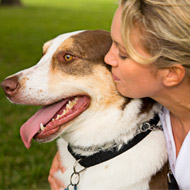Dog flu strains a ‘potential risk’ to humans

A study in Chinese pet dogs identified a new influenza strain.
A study by US scientists has revealed that influenza is becoming increasingly diverse in dogs and could present a risk to humans.
The research, published in the journal mBio, found a number of influenza viruses in dogs that had originally come from pigs and that they are starting to interact with each other.
“This is very reminiscent of what happened in swine ten years before the H1N1 pandemic,” the authors note.
In the study, researchers sequenced the complete genomes of 16 influenza viruses obtained from pet dogs in China. They found that the genomes contained three lineages that circulate in pigs - H3N2, H3N8 and a new strain, H1N1.
Scientists said that the new virus is of avian origin and therefore different antigenically from the H1N1s seen in the 2009 pandemic, and of different origin to that previously found in humans.
Work is now underway to further characterise the virus and assess whether humans have existing immunity against canine H1N1.
“If there is a lot of immunity against these viruses, they will represent less of a risk, but we now have one more host in which influenza virus is starting to have a diverse genotypic and phenotypic characteristics, creating diversity in a host which is in very close contact to humans,” said Dr. García-Sastre, director of the Global Health and Emerging Pathogens Institute.
“The diversity in dogs has increased so much now that the type of combinations of viruses that can be created in dogs represent potential risk for a virus to jump to a dog into a human.”
Researchers say that the time has come to restrict the circulation of avian influenza in dogs. The US and the UK targets avian influenza by culling and eliminating poultry from circulation.
“There are attempts to restrict influenza virus in pigs through vaccination and one could consider vaccination for dogs,” said Dr García-Sastre.



 RCVS Knowledge has welcomed Professor Peter Cockcroft as editor-in-chief for Veterinary Evidence.
RCVS Knowledge has welcomed Professor Peter Cockcroft as editor-in-chief for Veterinary Evidence.